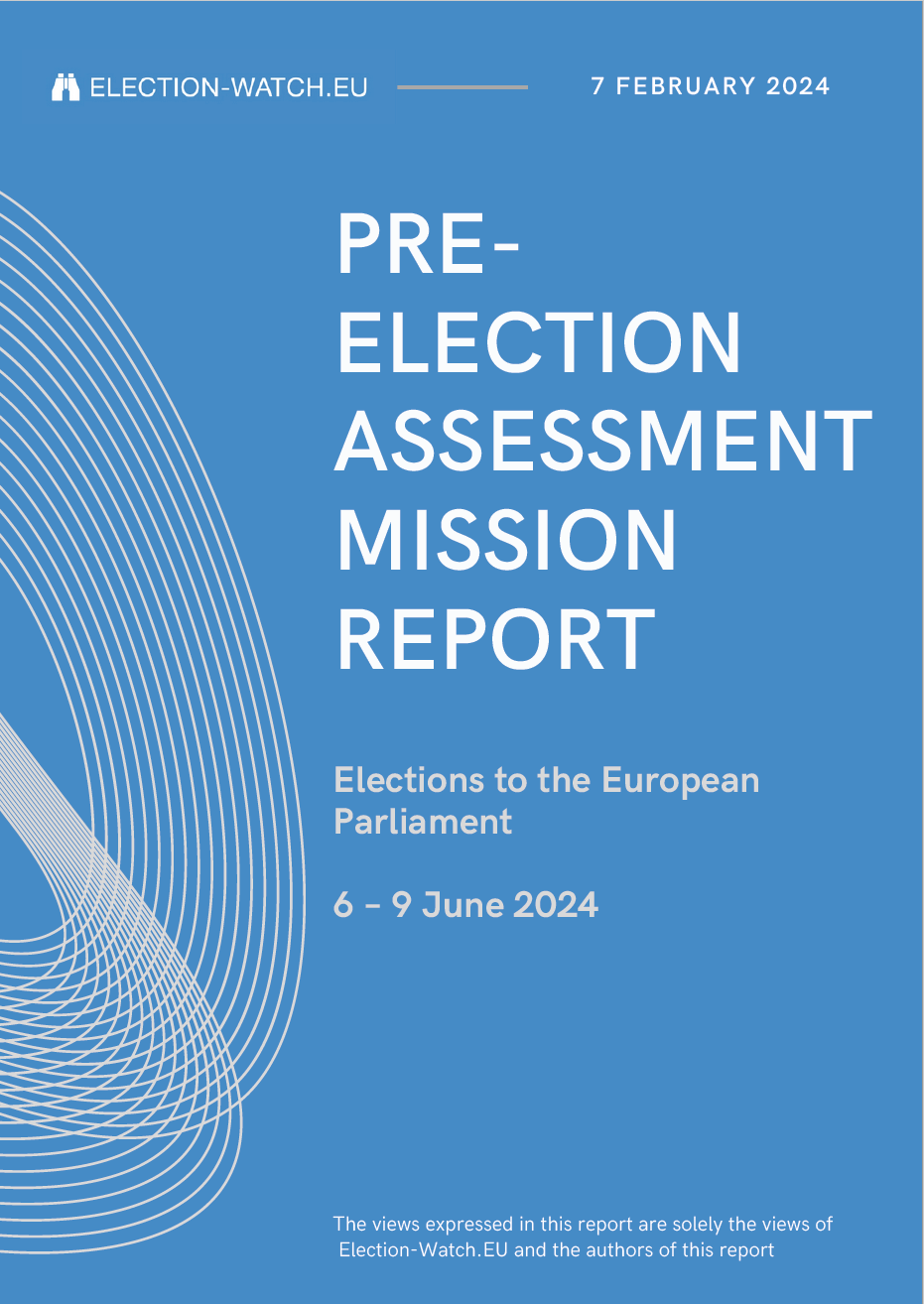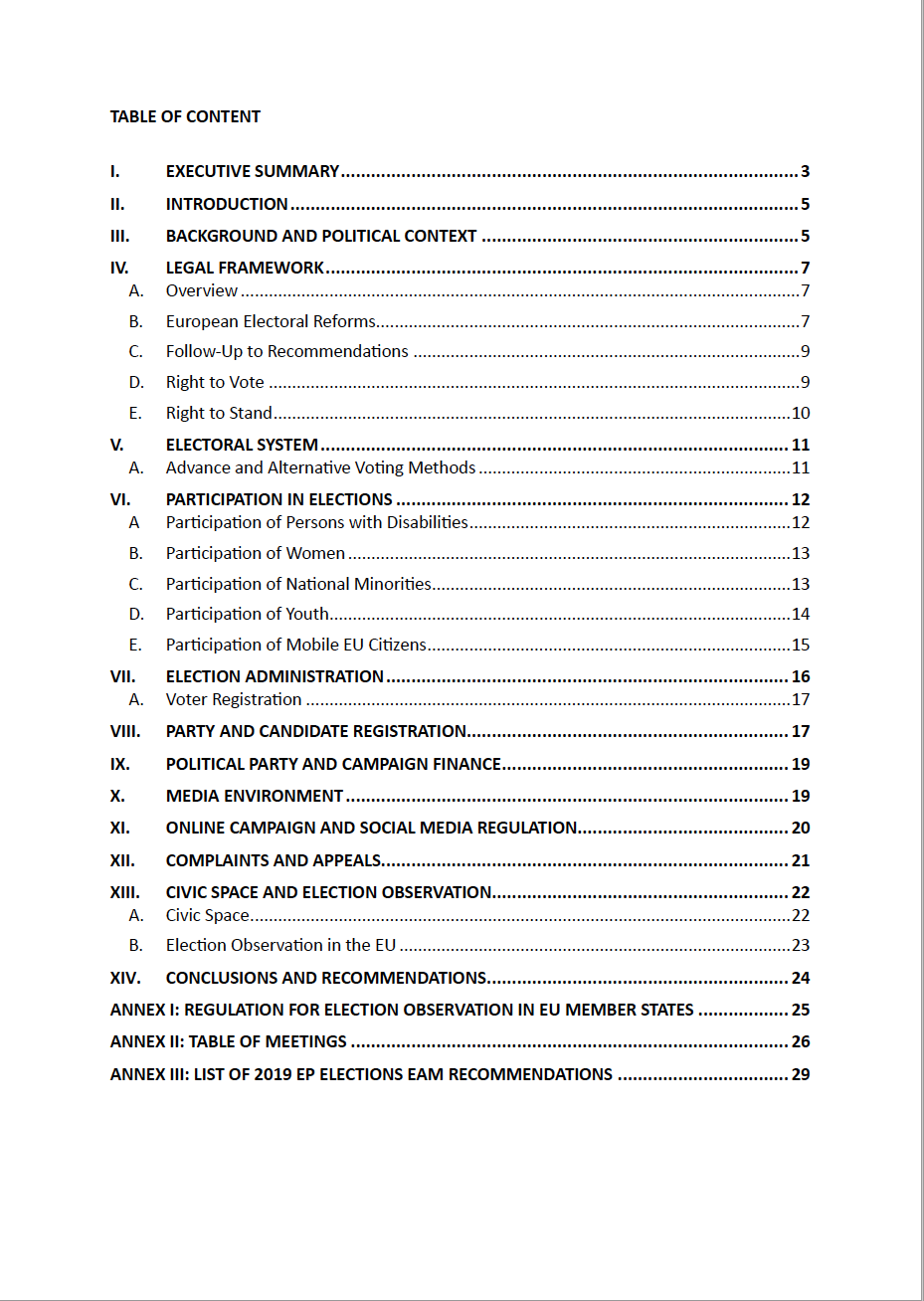PRE-ELECTION ASSESSMENT MISSION REPORT
The Pre-Election Assessment Mission evaluated the preparations for the European Parliament (EP) elections scheduled for 6-9 June 2024 and in February 2024 issued its pre-election asessment report, in which MEMO 98 experts participated as focal points for Slovakia.


Executive Summary
This is the second time that the non-partisan European civil society organisation (CSO) Election-Watch.EU conducts an independent EAM through its network of international election observers. The main thematic focus of the EAM includes the implementation of EU level regulations and recommendations, voter registration, the participation of mobile EU citizens, the regulation of online campaigning, political party and campaign finance, the media environment, the effectiveness of resilience measures against disinformation campaigns, cyberattacks and hate speech, as well as the inclusion of youth, women and persons with disabilities, among other areas.
Since the last EP elections in 2019, the European Union (EU) has been challenged by global and regional crises, in particular by Russia’s war against Ukraine, the Covid-19 pandemic, and the growing cost of living. As part of its overall geopolitical orientation, and in response to the increasing global significance of cyber-security of electoral infrastructure, disinformation campaigns and the use of Artificial Intelligence (AI), the EU made considerable efforts to safeguard electoral integrity and to enhance electoral resilience. It also undertook further steps to bolster the European character of EP elections and standardise procedures across MS. To promote citizen participation and safeguard European democracy, the EU organised the Conference on the Future of Europe 2021-2022 and the European Commission (EC) launched the European Democracy Action Plan 2020-2024.
The core EU-level legal framework for the 2024 elections remains the same as for the 2019 elections, although there have been some significant legislative initiatives including the adoption of the Digital Services Act (DSA) and the development of the Regulation on Transparency and Targeting of Political Advertising (TTPA). While the EP’s ambitious 2022 proposal to reform the European Electoral Act is not expected to find agreement in the Council of the EU, the 2018 Electoral Act amendment awaits approval from one MS to become effective. With the objective of protecting civic space and regulating the online space against malintended interference and disinformation, EU institutions have been further working on the Artificial Intelligence Act, the Media Freedom Act, and the 'Anti-strategic lawsuits against public participation (SLAPP)' Directive.
Ahead of the 2024 EP elections, the EU increased the number of seats in the EP from 705 to 720, with additional 15 seats distributed among 12 slightly under-represented MS to improve compliance with the degressive proportionality principle. Members of the EP are elected for a five-year term by direct universal suffrage through a free and secret ballot. Comparative analysis shows differences among MS in terms of representation and practices. The general EU principles of universal suffrage and equal treatment between nationals and non-nationals of other MS remain the only common benchmarks for enfranchisement, and MS have varied approaches to limitations on the right to vote. The minimum national voting age continues to vary across the Union with Belgium and Germany having recently lowered the voting age to 16 years. Despite being signatories to the Convention on the Rights of Persons with Disabilities, 13 MS have yet to eliminate voting restrictions for individuals whose legal capacity is restricted or revoked. EU law also leaves it largely to MS to define candidate eligibility conditions, which impose various restrictions for candidacy, and only some MS are allowing individual candidacy.
Electoral processes for the EP elections are organised by election management bodies (EMBs) at the MS level, and no European election authority and centralised voter registration exists. A major improvement in terms of coordination is the European Cooperation Network on Elections (ECNE) which is gaining in prominence as a cooperation forum for regular exchange among EMBs and other national bodies, with efforts to improve the accessibility of electoral processes and enhance the resilience against security risks and cyber threats. Through ECNE’s Crypto Tool, EMBs have begun to securely exchange information on mobile EU voters and candidates, to facilitate their suffrage rights and to prevent multiple registrations and candidacy. In the 2024 EP elections, around 366 million voters will be eligible to vote. An estimated 11 million mobile EU citizens can either vote in their country of citizenship or in their country of residence. A planned amendment of the Directive to enhance inclusion of mobile EU citizens has not yet passed and would not be applicable to the upcoming elections.
The funding of European political parties (EUPP) has become more proportional to their support in the EP elections over time. Since 2019, the Authority for EUPP and European Political Foundations (APPF) has grown in strength and capacity. It has registered ten EUPPs, and performs annual compliance controls of the parties’ incomes and expenditures. An amendment to the rules on EUPP finance has been discussed since November 2021, but is unlikely to be passed and affect the 2024 elections. While the APPF looks into the EUPP’s European campaigns, the rules and regulations at MS level do not always allow equal conditions for political parties to campaign for the European elections.
Media pluralism is declining in the majority of MS. The EC proposal for a European Media Freedom Act aims to strengthen transparency and editorial independence and counter concentration of media ownership. Online campaigning will be impacted by the newly applicable DSA that establishes a comprehensive framework for digital platforms, mandating the protection of user rights, combating disinformation and hate speech, and prompt removal of illegal content. The DSA prohibits targeted advertising for minors and restricts sensitive information use while expediting illicit content removal. As the current self-regulatory Code of Practice against Disinformation has limitations, the EC aimed with the TTPA, which is not yet applicable, at enhancing transparency in political advertising and particularly countering disinformation.
In line with international standards, several MS apply positive measures to advance the participation of women as candidates. Select EMBs, political parties and public broadcasters provide accessible information for persons with disabilities, but in many MS persons with disabilities still face legal and practical barriers to vote in secret and independently. More than half of the MS have recognised national minorities; the EU’s largest ethnic minority, the Roma, with approximately six million, lack inclusion and participation in politics. Following the first-time increase of voter turnout in 2019, partly attributed to an increase in youth participation, the EP emphasised the importance of a comprehensive strategy on European civic education. The EC has recommended MS should establish enabling environments for independent election observation including by citizens, as only few MS have legislation and accreditation systems in place.
Here is the full Pre-election Assessment Mission Report, including the list of 2019 EP Elections EAM recommendations. Based on the report and its recommendation a comprehensive Election Assessment Mission (EAM) within the 27 EU Member States (MS) has commenced its activities, including MEMO 98 experts.
The EAM will present its Preliminary Statement at the PRESS CONFERENCE on 10 June (14-16:00) in Brussels (Press Club). It will be livestreamed and recorded.
More details are available here. For media inquiries, please, write to office@election-watch.eu or contact +32 493 639 761. Predbežné vyhlásenie bude o nejaký čas k dispozícii aj v slovenčine.
Election-Watch.EU is an independent and non-partisan European civil society organisation (CSO) operating through a network of international election observers across the 27 European Union (EU) Member States (MS). The organisational goals are to strengthen European electoral processes through active civil society engagement, to identify gaps, and to promote good practices in the implementation of electoral processes through comparative analysis for inclusive electoral reforms. The overall objective is to enhance the integrity of the European Parliament (EP) elections by focusing on five key dimensions: equality, transparency, accountability, inclusion, and resilience. In 2019, Election-Watch.EU conducted its first Election Assessment Mission focusing on the comparability of electoral calendars, suffrage rights, regulations of campaign finance and social media, as well as on the inclusion of persons with disabilities.
